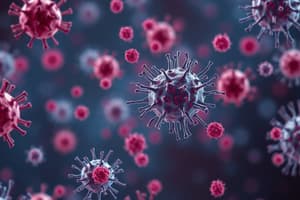Podcast
Questions and Answers
What is the primary role of T lymphocytes in the adaptive immune response?
What is the primary role of T lymphocytes in the adaptive immune response?
- Regulate immune response and kill infected cells (correct)
- Activate B cells for antibody production
- Produce antibodies to neutralize pathogens
- Transport immunoglobulins throughout the body
Which class of immunoglobulin is primarily responsible for protecting newborns against pathogens during the first six months of life?
Which class of immunoglobulin is primarily responsible for protecting newborns against pathogens during the first six months of life?
- IgM
- IgE
- IgA
- IgG (correct)
What distinguishes active immunity from passive immunity?
What distinguishes active immunity from passive immunity?
- Active immunity does not involve T and B cells
- Active immunity requires exposure to an antigen and antibody production (correct)
- Passive immunity is longer-lasting than active immunity
- Active immunity is always faster to develop
What is the main characteristic of humoral immunity?
What is the main characteristic of humoral immunity?
Which immunoglobulin class is known for its role in mediating allergic responses?
Which immunoglobulin class is known for its role in mediating allergic responses?
What is the function of memory cells in adaptive immunity?
What is the function of memory cells in adaptive immunity?
Where are antibodies primarily found in the secretory immune system?
Where are antibodies primarily found in the secretory immune system?
Which type of pathogen is primarily targeted by cellular immunity?
Which type of pathogen is primarily targeted by cellular immunity?
What is the largest immunoglobulin class that is produced during the initial response to an antigen?
What is the largest immunoglobulin class that is produced during the initial response to an antigen?
What is the main difference between T cells and B cells?
What is the main difference between T cells and B cells?
What change occurs in T-cell activity as individuals age?
What change occurs in T-cell activity as individuals age?
Which immunoglobulin class is notably deficient during pediatric immunity?
Which immunoglobulin class is notably deficient during pediatric immunity?
What role do maternal antibodies serve for newborns?
What role do maternal antibodies serve for newborns?
What is the effect of aging on antibody response to antigens?
What is the effect of aging on antibody response to antigens?
What aspect of thymic function changes with aging?
What aspect of thymic function changes with aging?
Flashcards are hidden until you start studying
Study Notes
Adaptive Immunity Overview
- Adaptive immunity, also known as the immune response, involves lymphocytes and antibodies.
- Response time is slower compared to inflammation, taking 7 to 14 days to activate.
- It is a specific response, tailored to the unique characteristics of the infecting microbe.
- The adaptive immune system retains memory, enabling quicker responses upon reinfection.
Key Components
- Antigens: Molecular targets that antibodies and lymphocytes respond to.
- T Lymphocytes (T cells): Develop in the thymus; perform functions like identifying and killing targets, regulating, or suppressing immune responses.
- B Lymphocytes (B cells): Develop in bone marrow; mature into plasma cells, which produce antibodies.
- Memory Cells: Formed from both T and B cells; they are activated rapidly during subsequent infections.
Immunity Types
- Humoral Immunity: Involves antibodies that circulate in the blood to combat extracellular microbes and toxins.
- Cellular Immunity: T cells travel through blood and tissues to defend against intracellular pathogens like viruses.
- Active (Acquired) Immunity: Developed in response to antigens, resulting in the production of antibodies due to infections or vaccinations.
- Passive (Acquired) Immunity: Occurs from exposure to infectious agents without pre-existing immunity; includes maternal antibodies transferred to newborns via placenta or breast milk.
Immunoglobulins (Antibodies)
- Immunoglobulin is the general term, while antibody refers specifically to the immune proteins.
- There are five classes of immunoglobulins:
- IgG: Most prevalent in blood; protective and can cross the placenta, safeguarding newborns for the first six months.
- IgA: Present in blood and secretions, playing a key role in mucosal immunity.
- IgM: The largest antibody; first to respond during initial antigen exposure.
- IgE: Involved in allergic reactions and defense against parasites.
- IgD: Functions as an antigen receptor on early B cells.
Secretory (Mucosal) Immune System
- Comprises lymphoid tissues that protect the body's external surfaces.
- Antibodies are found in tears, sweat, saliva, mucus, and breast milk, with IgA being the dominant type in these secretions.
Pediatric Immunity
- Infants have sufficient levels of immunoglobulin M (IgM) but show deficiencies in immunoglobulin G (IgG) and immunoglobulin A (IgA) responses.
- Maternal antibodies transfer to the fetus, providing critical immunity during fetal circulation and for the first few months after birth.
Geriatric Immunity
- Aging leads to decreased T-cell activity; the thymus shrinks to about 15% of its maximum size, affecting immune function.
- Thymic hormone production declines, impairing the organ’s capacity for T-cell differentiation.
- Older adults exhibit a reduced antibody response to antigens, compromising their ability to fight infections effectively.
Pediatric Immunity
- Infants have sufficient levels of immunoglobulin M (IgM) but show deficiencies in immunoglobulin G (IgG) and immunoglobulin A (IgA) responses.
- Maternal antibodies transfer to the fetus, providing critical immunity during fetal circulation and for the first few months after birth.
Geriatric Immunity
- Aging leads to decreased T-cell activity; the thymus shrinks to about 15% of its maximum size, affecting immune function.
- Thymic hormone production declines, impairing the organ’s capacity for T-cell differentiation.
- Older adults exhibit a reduced antibody response to antigens, compromising their ability to fight infections effectively.
Pediatric Immunity
- Infants have sufficient levels of immunoglobulin M (IgM) but show deficiencies in immunoglobulin G (IgG) and immunoglobulin A (IgA) responses.
- Maternal antibodies transfer to the fetus, providing critical immunity during fetal circulation and for the first few months after birth.
Geriatric Immunity
- Aging leads to decreased T-cell activity; the thymus shrinks to about 15% of its maximum size, affecting immune function.
- Thymic hormone production declines, impairing the organ’s capacity for T-cell differentiation.
- Older adults exhibit a reduced antibody response to antigens, compromising their ability to fight infections effectively.
Studying That Suits You
Use AI to generate personalized quizzes and flashcards to suit your learning preferences.




